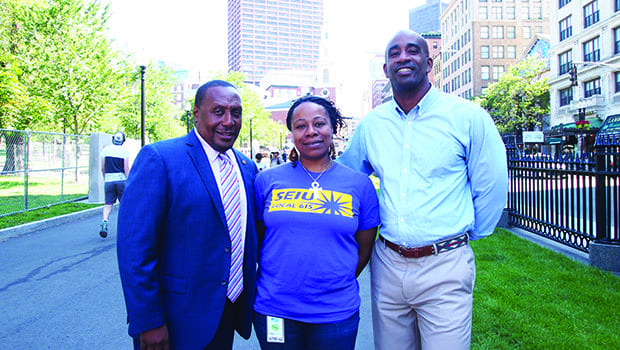
Back in January, Allen Lee didn’t know much about civil rights and labor leader A. Phillip Randolph, but when he found out a national organization named for the former head of the Pullman Porters Union was coming to Boston, he turned to a local source for scholarly research — his daughter.
“She educated me,” Lee says. “My whole life, I didn’t know he had organized the March on Washington.”
A few weeks later, Lee was helping to organize the A. Phillip Randolph Institute’s first-ever meeting in Boston. Hundreds of black labor activists from across the country attended the three-day conference, which was held at the Back Bay Sheraton Hotel. Former MBTA General Manager Beverly Scott addressed the conference.
Soon thereafter, Lee and other black labor activists opened Boston’s chapter of the A. Phillip Randolph Institute.
Formed in 1965 by Randolph and fellow civil rights activist Bayard Rustin, the institute works to build support for civil rights causes among its allies in organized labor as well as to develop support for organized labor in black communities. The group has 37 chapters around the country, including Boston.
While blacks in Boston have long had contentious relations with white-dominated labor unions, people of color have been making advances in recent years. Of the dozens of unions in Boston, only two are led by people of color — SEIU 32 BJ local 615, headed by Roxana Rivera, and SEIU 1199, led by Veronica Turner. But many unions now have people of color in leadership positions. Lee, who has been with the MBTA for more than 20 years, serves as district coordinator for strategies and partnerships with Boston Carmen’s Union Local 589.
Lee, who also serves as president of the Boston chapter of the A. Phillip Randolph Institute, says the group will work to help more people of color take on leadership roles in their unions.
“Our goal is to educate minorities about labor unions and give them a sense of belonging,” he said.
“Boston is a strong union city,” added Phil Reason, a senior organizer with the labor advocacy group Community Labor United. “What we hope to do is strengthen the bridge between the black community and unions. We understand the historical challenges. We want to change that.”
Lee’s journey to the executive board of the Carmen’s Union illustrates the opportunities and challenges facing people of color in the labor movement. When he began working as a trolley driver on the C Line in 1993, blacks, Latinos and Asians had formed an organization called Concerned Minority Employees to combat what many saw as an atmosphere of pervasive discrimination.
“At that time, there were vast disparities in how blacks and whites were treated at the T,” he said. “If a black person violated a rule, he would get a three-day suspension. If a white person did the same thing, he would get a warning.”
People of color had been coming into the MBTA in higher numbers after the agency began hiring by lottery, a move that helped reduce patronage hires and nepotism.
At the same time, the administration of former Gov. William Weld was pushing an aggressive privatization agenda, and MBTA employees were facing job cuts. The union fought back. Eventually, most of Weld’s privatization schemes were thwarted by the so-called Pacheco Law (1993), which mandated that agencies seeking to privatize services conduct a cost-benefit analysis to assess whether those services would cost less if provided by an outside contractor.
“I saw how labor could make a difference,” Lee said. “But I didn’t really see people of color involved, even though it was their jobs that were on the line.”
Lee set out to change that, working his way through the union ranks to the executive council.
Nowadays, he and the other leaders in the Boston chapter of the A. Phillip Randolph Institute see the organization as a platform to encourage more blacks to seek leadership in labor unions.
“Our goal is to educate people of color about labor unions and give them a sense of belonging,” said Khalida Smalls, vice president of the chapter and district coordinator for strategic partnerships at SEIU 32BJ.
Relative to other U.S. cities, Boston has a modest number of blacks in labor unions. And because many unions do not keep or share information about the race of their membership, it’s impossible to tell how many blacks are in the local labor movement. And there’s little communication among blacks in the city’s different unions.
Smalls said the A. Phillip Randolph Institute will create a space where black union members can network with each other.
The group meets monthly and hosts networking sessions and trainings.
“We’re here to support people to be strong and confident in their unions,” she said. “We’re building a tight support network and a structure that ensures we’re strong and able to support each other.”






